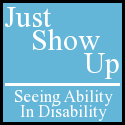
I can count the number of times I've been on a horse. Truth be told, I've never been on one. A few years ago, my youngest daughter took horseback riding lessons. I stayed as close as I dared while she rode the horse picked out for her, but I was never tempted to scale the mighty mountain of a horse.
Even as a child, when I crouched under my bedcovers and read Black Beauty into the night, or years later, as I breathlessly watched Robert Redford effortlessly work his magic in The Horse Whisperer, I was determined that "East is East, and West is West, and never the twain shall meet."
My daughter, thankfully, had no such reservations about hopping up on one of these magnificent beasts. As I tiptoed around them, she learned everything she could about the care and feeding of horses. She cleaned their hooves, spent countless hours brushing them down, and in no time at all, she was able to prepare a horse for riding in a matter of minutes.
I stood in awe as she even managed to win a battle of wills with one particularly rebellious stallion. In the end, they became fast friends. This shouldn't have come as a surprise. The horse is a social animal, forming strong bonds with members of its herd. As I stood at a safe distance, it became obvious, too, that horses possess almost a sixth sense, picking up on subtle social cues. If my daughter was feeling 'blue,' her new best friend dropped his rebel-without-a-cause routine and became gentler with her.
As a result, her self-esteem increased dramatically during the years she spent with him. She grew into a confident woman, devoid of body image issues, and always eager to climb another mountain.
I found it interesting, therefore, to read that "riding horses can help the disabled physically, by strengthening muscle tone and learning balance. But, riding also increases self-confidence and awareness of one's body, according to those involved in horse therapy programs." Hippotherapy (the word 'hippotherapy' comes from the Greek 'hippos,' meaning horse and 'therapy,' meaning care. Thus, hippotherapy is the utilization of the horse for therapeutic purposes rather than equestrian goals. Source: The Canadian Therapeutic Riding Association) "may also affect psychological, cognitive, behavioural and communication functions for clients of all ages. Clients who may benefit from hippotherapy can have a variety of diagnoses: examples include cerebral palsy, multiple sclerosis, developmental delay, traumatic brain injury, stroke, autism, and learning or language disabilities."
In combination with other therapeutic treatments, such as music or art therapy, service dogs, occupational therapy, intense early intervention (Applied Behaviour Analysis), speech therapy, and physical therapy, just to name a few, horse therapy can sometimes achieve amazing results.
My daughter asked me recently if I'd be interested in taking riding lessons with her. Maybe it's time to befriend my own Black Beauty, and take a page from others who have benefited from the deep connection they've forged with horses. Time to get off my high horse, for who knows, maybe this will be another golden opportunity for another mother-daughter bonding experience.













































11 comments:
My daughter (age 4 - Down syndrome & autism) has been doing hippotherapy for about a year and it's been amazing!
Your work, and obviously your writing make a difference. I appreciate your comment and the birthday wish. I had one the best ever :)
Thank you for helping to increase the awareness of how animals can benefit the lives of humans. They like to be involved in improving our wellbeing because it benefits them too.
Blessings to you Maureen!
Thanks, Datri, for your feedback - yes, hippotherapy can work wonders, especially in combination with other therapeutic treatments.
And thank you, Jeff, for your kind words, and for your insightful comment that the connection between animals and humans is a reciprocal one. I'm glad to hear that you had a wonderful birthday!
After many years of riding horses, in several provinces, I discovered that it has been clinically documented that just being around horses changes the brain wave patterns of humans. I agree. We calm down and become more centered and focussed in the present when we are with horses.
In the embryonic field of Equine Experiential Learning, I believe we don’t yet know enough to know how much we don’t know.
Kudos to this wonderful ideal-way blog for continually advancing mainstream awareness of ever wider varieties of new ways to perceive, relate to, and help, persons with Down syndrome, Autism, etc.
You have a very powerful mind that can make anything happen as long as you keep yourself centered.
Thank you, Pierre, for your insightful comments. I agree: there is so much we don't know about the therapeutic effects of just being around horses.
It seems we have many God-given resources, such as dogs and horses, music, art and poetry, that are helping those in the special needs community. But "we don’t yet know enough to know how much we don’t know"!
Generally, persons that bond with domesticated, ‘herd mentality’ animals, like horses and dogs, etc. are excellent examples of inter-species mutualism.
An intra-species example that I have experienced is the mutualism enjoyed by persons with Down syndrome, Autism, etc and Ideal-Way volunteers.
In either case, it creates a fundamental win/win.
I believe that exposure to inter-species mutualism can be a bridge to intra-species mutualism.
Thanks, Gordo, for your insightful comments. And you're right about the mutualism enjoyed by persons with Down syndrome, Autism, etc and Ideal-Way volunteers.
When we begin to see ability in disability, instead of 'limitations' in the disabled, we're able to enjoy a service-service mutualism. Persons with Down syndrome, autism, etc. have much to teach us, and vice versa.
"In either case, it creates a fundamental win/win."
Oh Mareen, I think you really would love the whole horseback riding thing and such a bonding moment with your daughter!! Yes I had read some of things that people had written about how awesome the therapy and results from horses could be.
I myself am a horse lover and always have been. This is the first time in my life I haven't had a horse, but hope to soon one day and share that experience with my son, who is only 2 right now.
Yes, I really think I will like horseback riding - and since we live in the country (we're surrounded by horses!), I really don't have an excuse!
I do hope you're able to share that experience with your son. I was reading that the typical age range for beginners is between 5-7 years old, so you still have time!
"There are two ways to live your life.
One is as though nothing is a miracle.
The other is as though everything is a miracle."
~Albert Einstein~
either way, the mutually beneficial inter-species observations on this page seem nothing short of miraculous.
Post a Comment